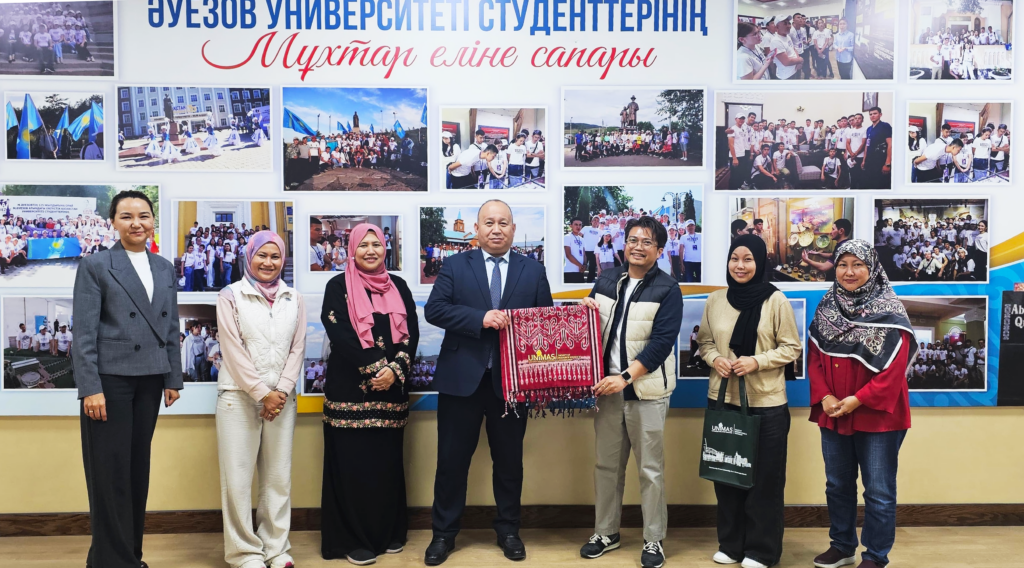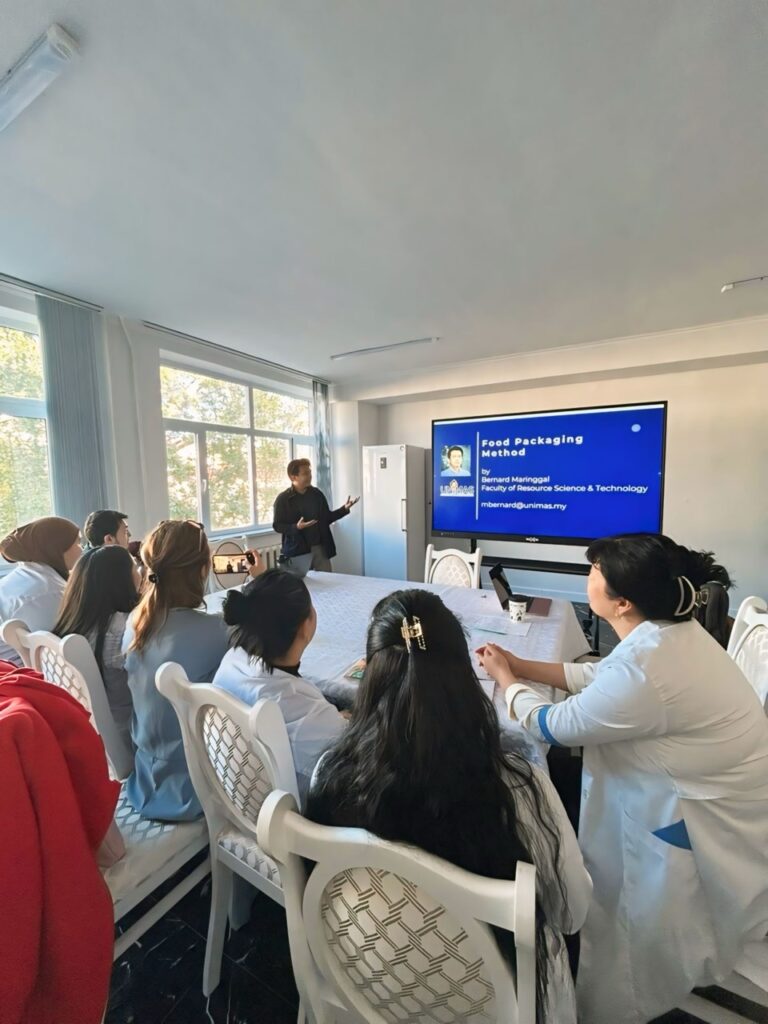
Dr. Bernard Maringgal, a lecturer and researcher from the Agrotechnology Programme at the Faculty of Resource Science and Technology (FRST), recently concluded a month-long visit to M. Auezov South Kazakhstan University, where he focused on innovative food packaging technology derived from agricultural waste. From October 6 2024 to November 6, 2024, Dr. Bernard engaged in groundbreaking research and academic activities aimed at developing sustainable solutions for the global food industry.
Innovating Sustainable Food Packaging
A key highlight of Dr. Bernard’s visit was the development of a research project titled “Development of Technology for the Production of Biodegradable Film for Food Packaging,” where he serves as a co-researcher alongside Assoc. Professor Ir. Dr. Norhashila Hashim from Universiti Putra Malaysia. On the M. Auezov South Kazakhstan University side, the project is led by Professor Dr. Shingisov Azret Utebayevich, Head of the Department of Technology and Safety of Food Products at the Higher School of Textile and Food Engineering. This innovative initiative aims to address the pressing issue of plastic waste by creating sustainable, biodegradable alternatives for food packaging.
The project leverages wheat straw, an abundant agricultural residue in Kazakhstan, to produce eco-friendly packaging materials. This approach not only reduces reliance on traditional plastics but also promotes a circular economy by repurposing underutilized agricultural byproducts. The integration of advanced materials science and agricultural engineering positions this project as a potential game-changer for the global food packaging industry.
Dr. Bernard explained that the goal is not only to provide a solution to the growing problem of plastic waste but also to add economic value to agricultural residues. This approach benefits farmers, manufacturers, and the environment alike.

Sharing Knowledge in Food Preservation
Dr. Bernard’s passion for sustainable food technology extended beyond research to education. During his visit, he conducted a series of lectures for postgraduate students on Modified Atmosphere Packaging (MAP) and edible coatings. These technologies are essential for extending the shelf life of fresh produce while maintaining quality and reducing food waste. His lectures offered an in-depth exploration of the science and applications of these innovative technologies, equipping students with the tools needed to advance food preservation methods in their own research and industries. By blending theoretical knowledge with practical insights, Dr. Bernard inspired the next generation of food scientists in Kazakhstan to prioritize sustainability in their work.
Enhancing International Collaboration
Dr. Bernard’s visit underscored the importance of global collaboration in addressing challenges in food research and technology especially on fresh produce application. The discussions and activities during his visit highlighted the shared commitment of both Universiti Malaysia Sarawak and M. Auezov South Kazakhstan University to advancing sustainable solutions in food packaging for fresh produce.
A potential formal partnership, such as a Memorandum of Understanding (MoU) or Memorandum of Agreement (MoA), could further strengthen this collaboration. Joint initiatives in food packaging research could lead to innovations that have a profound impact on global food security and environmental sustainability.


Looking Ahead: A Sustainable Future for Food Packaging
“The work we began here is just the start of a journey toward sustainable and biodegradable food packaging solutions. By combining local expertise with international perspectives, we can create technologies that address pressing global challenges while fostering academic growth.” – Ts. Dr. Bernard Maringgal
The outcomes of his visit highlight the vital role of food packaging technology in shaping a sustainable future. Through a focus on biodegradable materials and innovative preservation techniques, Dr. Bernard has laid the groundwork for transformative advancements in the industry, demonstrating the potential for science and technology to contribute to environmental sustainability.
As both institutions look ahead, the foundations established during this collaboration hold immense promise for driving progress in food packaging and beyond. Dr. Bernard’s dedication exemplifies the profound impact of academic partnerships in tackling global issues, ensuring meaningful contributions to the food industry and the preservation of the environment.


Acknowledgement
Special thanks to M. Auezov South Kazakhstan University and the Ministry of Science and Higher Education of the Republic of Kazakhstan for hosting and funding the Visiting Professor Program. This initiative has provided a significant platform for meaningful academic exchange, fostering collaboration in research and education. The program not only enabled the sharing of innovative ideas and expertise but also strengthened international partnerships, paving the way for impactful advancements in sustainable technologies and agricultural practices. The opportunity to engage with students, faculty, and researchers has been truly enriching, leaving a lasting impact on both personal and professional development, as well as the broader academic community.
Written by: Ts. Dr. Bernard Maringgal